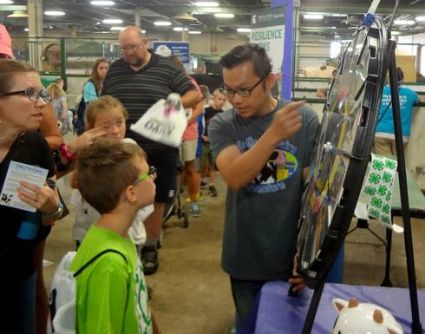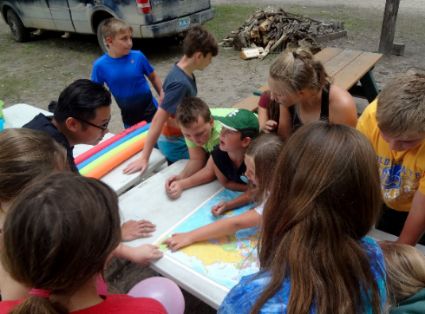News & Events
Taiwan 4-H staff member travels to Michigan to experience our 4-H program
A Taiwan 4-H staff member is gaining staff development experience and learning from our
Michigan 4-H program as part of the IFYE Association’s Foreign Exchange Program.
December 13, 2018 - Author: D'Ann Rohrer, Michigan State University Extension
This article has been approved by D'Ann Rohrer for viewing on IFYE.

The IFYE Association conducts international exchange programs and cross-cultural education while promoting global awareness. The IFYE Foreign Exchange Program is for individuals 19 years old or older and typically lasts three or six months while changing host families every three to five weeks. As a participant in the program, you will live and work as part of the family. When Wei-Jia (Colin is his American name) from Taiwan decided to participate, he wanted to take the exchange to a new level and participate as a staff development experience as well.
Colin was placed with three host families; two were Michigan State University Extension staff working in the 4-H field, so Colin would experience many 4-H camps and activities. His third host was an experienced IFYE host and retired farmer. Colin had many experiences related to farming in Michigan, agriculture and 4-H. It was the perfect placement for his goals.

Enjoy reading about Colin’s experience in Michigan.
D’Ann (D): How did you decide to come on exchange as an adult?
Colin (C): I am a 4-H staff, our 4-H program comes from the USA. I wanted to learn more about 4-H and how they do things.
(D): How did you feel when you learned your homestay was in Michigan?
(C): I was surprised; I researched online to see Michigan 4-H Extension and agricultural program. I think maybe since I was 4-H staff they put me here.
(D): Explain to me the IFYE organization.
(C): It began in Taiwan in 1952, 66 years ago. Maybe IFYE started 4-H, we are all IFYE and 4-H members. We must join many 4-H activities and competitions in 4-H clubs, then when you turn 18 years old you can join IFYE competition. Fifty members participate in this competition, but only 26 4-H staff or young farmers can become an IFYE, which go abroad to their country of choice. We can choose from USA, Canada, Norway, Finland, Japan, India, Philippines, Switzerland, Sweden, Korea and Thailand. Agricultural Foundation pays half of the fee to participate in IFYE abroad experience.
(D): Tell me about your 4-H supervisor position in Taiwan.
(C): My business right now is agriculture in the village. All vegetable promotion right now, including urban gardens with 4-H students in the school. The space we use for growing was given by farmers. We built a greenhouse, grow vegetables and take home for 4-H project. Farmers will teach youth how to grow vegetables. The youth receive education on what kind of food will grow right now in our climate. Farmers and 4-H youth do communication and education. Out of 13 districts, only five do urban gardens, two of which are through the schools. We pay the farmer money, $50 an hour to teach the youth. Youth are 9 to 24 years old. Eleven-and-12-year-olds grow the food in schools. Some schools also have a chicken house with the youth in the schools; the children will feed the chickens and collect the eggs. We sell the eggs on the farm and the money raised from selling the vegetables will fund the project the following year. I also supervise a 4-H Elite club for 18-year-olds and up. I teach them how to plan activities and train the leadership staff. There are three days of leadership training and I pay them money to attend. Some of these leaders become 4-H volunteers. When they have a job, it is very difficult to volunteer. 4-H activities take place during the day, so kids are home at night to study and it is dark at 6 p.m. Holiday is the only time for all day 4-H activities.
(D): How did you prepare to come to the U.S.?
(C): Because I want to be an IFYE for a long time, I have some classmate in the U.S., so I talk to them and they will tell me a lot. The IFYE group also shares information on how to prepare your gifts and prepare your mind. I did a lot of homework to learn about the stay. I taught myself English three years ago. I watched English movies a lot and listened to English. I had some English lessons in junior high school and in high school—it was a choice class
(D): What do you want to see and what do you want to take back to your country?
(C): I want to make 4-H clubs better and better. I want to learn how to get youth back to a 4-H club as leaders. At 24 years old, our adults must get a job or be a soldier, so their chance is very less to become involved in 4-H.
(D): What do you hope to experience during your exchange?
(C): I hope to have 4-H and farm experience. I want to see how to do the 4-H activities and experience American lifestyle. I like how you make things in your home—we do not. We buy things, very convenient. At home you only want to take a rest. Mother has a job, so she does not have time to prepare dinner. Our 4-H cooking class should be to teach parents how to cook; if the children learn to cook, some parent won’t listen to children. Our country is upside down.
(D): How will you use this experience back in your country?
(C): Hard to say, I think the social struggle is very different. I will try to change our social struggle. Parents do not know 4-H. 4-H can bring knowledge to parents, so some parents do not encourage youth to attend 4-H activities. I understand that promotion in our community can be stronger, then the parents may support 4-H more. We have many 4-H volunteers that love spending their time with children. I know children will be good in 4-H to become an IFYE. I need to share my knowledge and use technology better. I will speak with parents to explain the value of 4-H. Communication is valuable. In Taiwan, 4-H is based on farmers association and they do not tell community children, so 4-H is very closed. I want 4-H for all people, even those without farms.
(D): What do you miss most while you are in Michigan?
(C): I think in Michigan, I have everything. I am a shy man, but people are very friendly here.
(D): Because of this experience, how will your life be different?
(C): I think everything is different. IFYE is a learning process. I am learning and enjoying it. Everything is interesting to me. When I go home, I can get it. I want to try everything. Open my mind. They call me supervisor in Taiwan. We plan activities, but here I follow you and responsibilities, here I am free. When I go back to Taiwan, I want to find a solution to our 4-H problem.
IFYE is a unique program because of the age of the exchange delegates, multiple host family experience, length of stay, and total cultural immersion experience. Michigan also offers outbound IFYE experiences.


